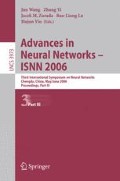Abstract
Economic contribution rate of education is the key factor of education economy. In this paper, a soft computing method of economic contri-bution rate of education is proposed. The method is composed of four steps: The first step is doing fuzzy soft-clustering to object system based on levels of science technology and getting optimal number of clusters, which determines number of fuzzy rules. The second step is that the fuzzy neural networks FNN1 from human capital to economic growth is constructed and we obtain economic contribution rate of human capital α k . The third step is that the fuzzy neural networks FNN2 from education to human capital is constructed and we obtain human capital contribution rate of education α′ k . The fourth step is calculating economic contribution rate of education ECE k = α k ×α′ k . At last, the economic contribution rate of education of China is obtained.
Access this chapter
Tax calculation will be finalised at checkout
Purchases are for personal use only
Preview
Unable to display preview. Download preview PDF.
References
Min, W., Ding, X.: Review and Expectation of Advanced Education Economy in China. Advanced Education Research 1(3), 6–11 (1999)
Wang, S.: Research of Input and Output of Education. Hebei Education Press, China (1999)
Zhang, T.: Education Industry. Advanced Education Press in Guangdong Province, Guangzhou (1998)
Yang, D.: Real Significant and Necessary of Developing Education Industry. Advanced Education Research 2(6), 51–56 (1999)
Lai, D.: Education and Income Allocation. Beijing Normal University Press, Beijing (1998)
Guo, S., Gang, C.: Soft Computing in Information Science. Northeast University Press, Shenyang (2001)
Zeng, K., Zhang, N., Xu, L.: Linear T-S Fuzzy System’ Sufficiency Condition. Autoimmunization Transaction 27(5), 606–612 (2001)
Yao, M., Huang, Y.: Research of Fuzzy System. System Engineering Theory and Application 22(5), 98–103 (2000)
Zhu, K., Su, S., Li, J.: Fuzzy c-mean of Optimal Clusters. System Engineering Theory and Application 23(3), 52–61 (2005)
Bezdek, J.C.: Pattern Recognition with Fuzzy Objective Function Algorithms. Plenum Press, New York (1981)
Fan, X.: Review and Expectation of Education Economy in China. Advanced Correspondence Transaction 2(2), 27–32 (1997)
Author information
Authors and Affiliations
Editor information
Editors and Affiliations
Rights and permissions
Copyright information
© 2006 Springer-Verlag Berlin Heidelberg
About this paper
Cite this paper
Guo, Hx., Zhu, Kj., Li, Jl., Xing, Ym. (2006). A Soft Computing Method of Economic Contribution Rate of Education: A Case of China. In: Wang, J., Yi, Z., Zurada, J.M., Lu, BL., Yin, H. (eds) Advances in Neural Networks - ISNN 2006. ISNN 2006. Lecture Notes in Computer Science, vol 3973. Springer, Berlin, Heidelberg. https://doi.org/10.1007/11760191_171
Download citation
DOI: https://doi.org/10.1007/11760191_171
Publisher Name: Springer, Berlin, Heidelberg
Print ISBN: 978-3-540-34482-7
Online ISBN: 978-3-540-34483-4
eBook Packages: Computer ScienceComputer Science (R0)

